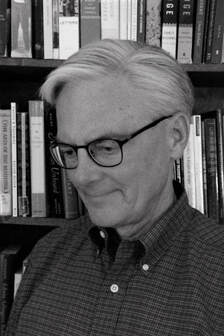
CHARLES HUGHES
Charles Hughes was born in Chicago, Illinois. He earned a B.A. from Augustana College, in Rock Island, Illinois, and a J.D. from Northwestern University, and worked as a lawyer for thirty-three years before his retirement. His poems have appeared in America, the Anglican Theological Review, Dappled Things, First Things, the Iron Horse Literary Review, Measure, The Rotary Dial, the Sewanee Theological Review, Verse Wisconsin, and elsewhere. He lives with his wife in the Chicago area.
Praise for The Evening Sky
"The freshness and force of Charles Hughes’s descriptions—of Midwestern landscapes, of people known deeply or seen in passing—are equaled by his masterly control of prosody, resulting in poems that are made to last. A sensitivity both to things of this world and things of the spirit, a compassionate shrewdness, is present throughout this collection. The gracefully maintained balance here of thought and feeling should ensure that readers who first encounter the work with admiration will return to it with renewed pleasure."
—Robert B. Shaw, author of A Late Spring, and After and Blank Verse
"Charles Hughes’s fine new book, The Evening Sky, is rich in thoughtful, well-written poems that claim our attention not by extravagant gestures but by speaking to us openly and honestly about the nature of our time and place. I find it difficult to write a better, more accurate description of this book than Hughes himself has done, in a poem about a widowed professor who every year now teaches Camus’ La Peste, and who responds to the threat of despair with the recognition that '. . . the book’s deep themes / Are human love and hope / And how these things endure / Amid death's ravages— / Or may.' The poem ends fittingly with the words, 'It matters what he says.' So it does."
—Charles Martin, author of Future Perfect and Signs & Wonders
Praise for Cave Art
“Charles Hughes can see and say things exactly. In 'Signs,' for instance, 'Blotches of snow in March' look like 'the candle wax / Left over from a party, dirty white / Beneath today’s strong sun.' The subjects of his poems range from the modestly domestic (as in 'Mornings after Thirty-Eight Years,' a portrait of a long, happy marriage) to the gravely historical (as in 'Easter Spoils, 2012,' a moving meditation on the death of Dietrich Bonhoeffer). In the title poem of Cave Art, Hughes speaks of 'dazzling life that . . . still survives as art and evidence,' and this could serve as a description of the book itself.”
—Timothy Steele
“In these beautiful, moving poems, Charles Hughes unearths the 'stark, dazzling' artifacts, if you will, of a past that 'still survives as art and evidence,' in the words of the marvelous title poem, the words of a keen, big-hearted observer and a gifted craftsman. Cave Art is a wonderful, rewarding debut.”
—Greg Williamson
Charles Hughes was born in Chicago, Illinois. He earned a B.A. from Augustana College, in Rock Island, Illinois, and a J.D. from Northwestern University, and worked as a lawyer for thirty-three years before his retirement. His poems have appeared in America, the Anglican Theological Review, Dappled Things, First Things, the Iron Horse Literary Review, Measure, The Rotary Dial, the Sewanee Theological Review, Verse Wisconsin, and elsewhere. He lives with his wife in the Chicago area.
Praise for The Evening Sky
"The freshness and force of Charles Hughes’s descriptions—of Midwestern landscapes, of people known deeply or seen in passing—are equaled by his masterly control of prosody, resulting in poems that are made to last. A sensitivity both to things of this world and things of the spirit, a compassionate shrewdness, is present throughout this collection. The gracefully maintained balance here of thought and feeling should ensure that readers who first encounter the work with admiration will return to it with renewed pleasure."
—Robert B. Shaw, author of A Late Spring, and After and Blank Verse
"Charles Hughes’s fine new book, The Evening Sky, is rich in thoughtful, well-written poems that claim our attention not by extravagant gestures but by speaking to us openly and honestly about the nature of our time and place. I find it difficult to write a better, more accurate description of this book than Hughes himself has done, in a poem about a widowed professor who every year now teaches Camus’ La Peste, and who responds to the threat of despair with the recognition that '. . . the book’s deep themes / Are human love and hope / And how these things endure / Amid death's ravages— / Or may.' The poem ends fittingly with the words, 'It matters what he says.' So it does."
—Charles Martin, author of Future Perfect and Signs & Wonders
Praise for Cave Art
“Charles Hughes can see and say things exactly. In 'Signs,' for instance, 'Blotches of snow in March' look like 'the candle wax / Left over from a party, dirty white / Beneath today’s strong sun.' The subjects of his poems range from the modestly domestic (as in 'Mornings after Thirty-Eight Years,' a portrait of a long, happy marriage) to the gravely historical (as in 'Easter Spoils, 2012,' a moving meditation on the death of Dietrich Bonhoeffer). In the title poem of Cave Art, Hughes speaks of 'dazzling life that . . . still survives as art and evidence,' and this could serve as a description of the book itself.”
—Timothy Steele
“In these beautiful, moving poems, Charles Hughes unearths the 'stark, dazzling' artifacts, if you will, of a past that 'still survives as art and evidence,' in the words of the marvelous title poem, the words of a keen, big-hearted observer and a gifted craftsman. Cave Art is a wonderful, rewarding debut.”
—Greg Williamson

